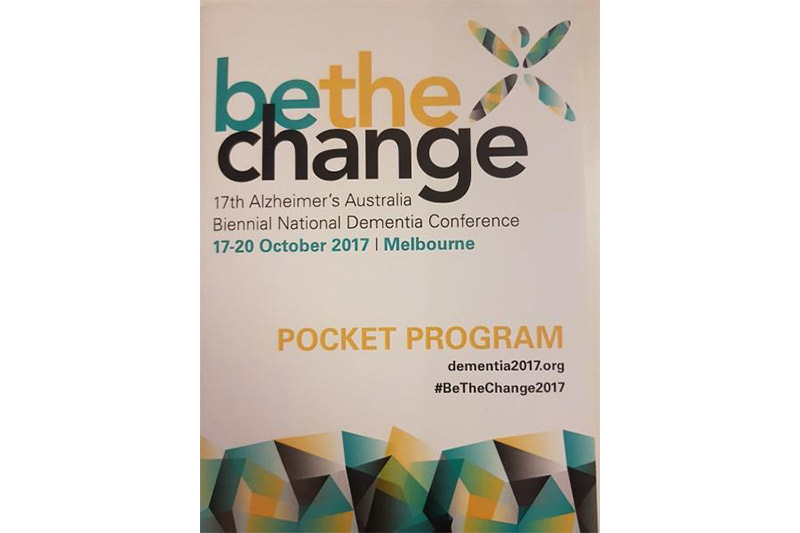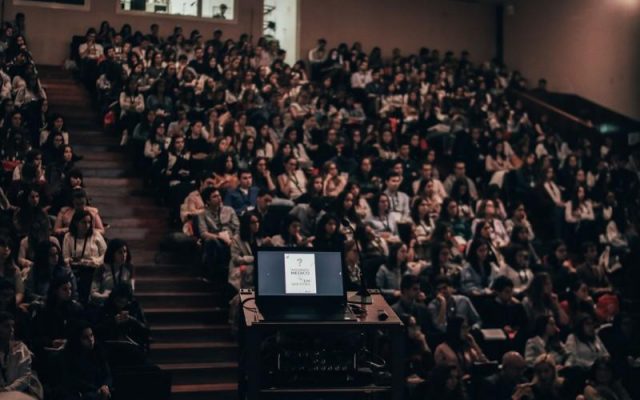
#BeTheChange2017 for dementia
There are more than 410,000 Australians living with dementia; about 26,000 of whom have younger onset dementia (a diagnosis under the age of 65). By 2025, this is expected to increase to over 530,000. Dementia is the second leading cause of death in Australia and the greatest cause of disability in older Australians.
This is clearly one of the significant policy problems for Australia and the world today – both in terms of finding a cure and creating the systems and the culture that enable people with dementia to live well.
The National Dementia Conference set the challenge to be the change now. The opening keynote Christine Bryden (an author and dementia advocate) called on everyone to be the change in our homes, communities, workplaces and industries.
How? The key learnings from the conference were that listening to people living with dementia, co-designing service models, increasing choice and control, enabling rather than doing for, and harnessing technology are clearly the way forward.
Speakers living with dementia had a strong voice at the conference. Kate Swaffer (CEO and co-founder of Dementia Alliance International) kicked off Day 2 by crushing the misleading myths that people with dementia are ‘empty shells’, can’t communicate and can’t live positively. She showed how people with dementia are driving change around world. Trevor Crosby spoke about living well through acceptance, early diagnosis, positive thinking and getting on with life. While Brace Bateman brought a peashooter to the stage to demonstrate finding ways to be joyful and spoke of the positive reception he had when disclosing his diagnosis.
However, as one audience member with dementia shared, not everyone finds acceptance. Dementia Australia surveys reflect this.
The language we use matters. Both Dennis Frost (an advocate living with dementia) and Dr Sam Davis identified the language around dementia that marginalises and minimises the views of people living with dementia.
On Day 2 audience members with dementia set change in motion in real time with the introduction of a person with dementia to the panel on rights, risk and autonomy. The panel identified a need for a different way of thinking about duty of care and dignity of risk – recognising that duty of care includes listening to and respecting the person with dementia not only risk management. As Madeline Gall (CEO of Lifeview) said, duty of care doesn’t mean wrapping a person with dementia in cotton wool the minute they walk into a residence. Providers should understand the individual’s risk appetite and respond.
The need to find ways to increase choice also came through in Dr Craig Sinclair’s (University of Western Australia) session on substitute or supported decision-making. He noted that there has been much legal and ethical debate but that this has been missing the voice of people with dementia and that limited practical tools have been developed to support decision-making. Research with people with dementia identified the desire to maintain as much choice as possible, but that decisions are also made in a relational context, with family members.
Carers of people living with dementia spoke about the barriers they experience in supporting their loved ones to live with dignity, and as independently as possible for as long as possible. They called for attitudinal change to enable increased independence and quality care.
Creating Dementia Friendly Communities is one way to be the change as Kate Swaffer and Dr Kathleen Doherty identified. Dementia friendly is “people friendly” and can have benefits for the broader community.
We’re proud to be working with Dementia Australia on a developmental evaluation of the national Dementia Friendly Communities program. The program builds on the evidence from existing dementia friendly community initiatives and has been co-designed with people with dementia. It encourages people to register as a Dementia Friend through the online Hub at www.dementiafriendly.org.au. The Hub includes:
- A Resource Hub for information on what a dementia friendly community is, how different members of the community can make practical changes that improve the lives of people with dementia, and showcases dementia friendly communities in action.
- The Learning Centre for free online training to raise awareness of the difficulties faced by people living with dementia and how you as a dementia friend can assist.
- The Online Community for a place to connect and share challenges and successes for individuals and communities across Australia.
We believe evaluation can help be the change if it truly involves people with dementia. As several conference presentations identified, evaluation can help to identify what works, potential improvements and guide future implementation.




